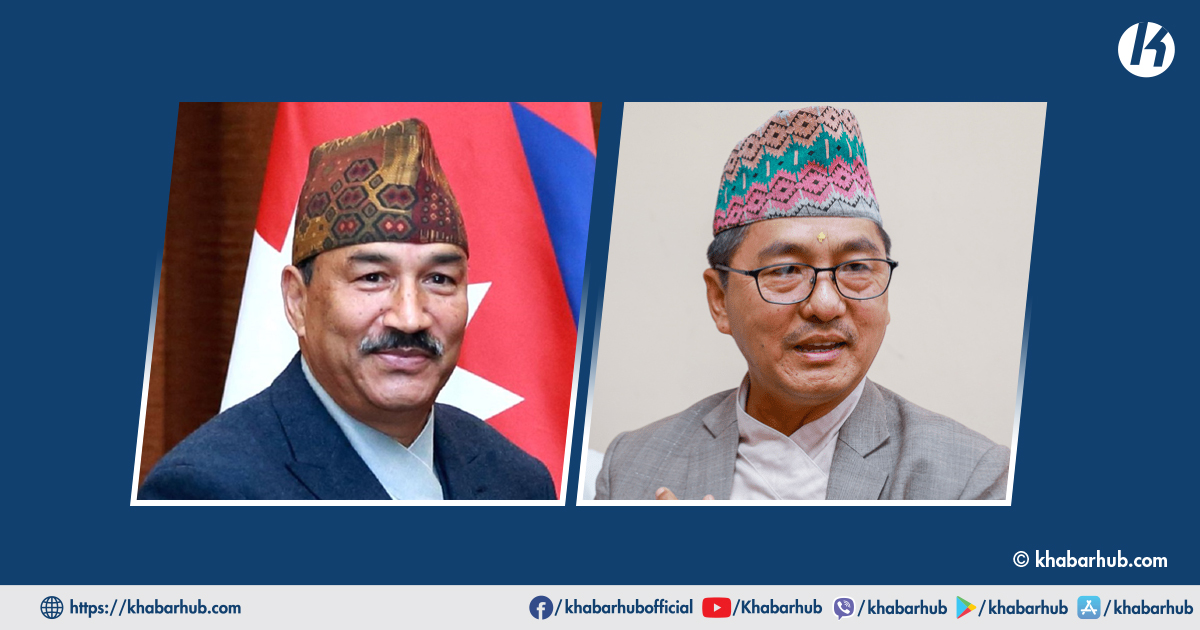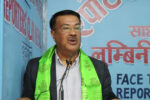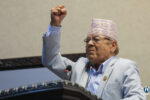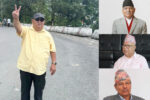KATHMANDU: Nepal’s monarchist parties are as adept at splitting as the communist factions.
Both the communists and monarchists, split into various groups, continue to talk about internal unity.
While the Maoist factions are discussing unity, the monarchist parties are now also considering mutual unity.
Recently, discussions have begun between RPP leaders Rajendra Lingden and Kamal Thapa. With their meeting, rumors have surfaced that the monarchist parties, which split three years ago, might reunite.
Is the unity of RPP and RPP-Nepal possible? Before exploring this question, it is important to recall the reasons behind the split between Kamal Thapa and Rajendra Lingden.
Why did Thapa and Lingden split?
Rajendra Lingden was elected president of the Rastriya Prajatantra Party (RPP) during its general convention in 2078 BS. Less than two months later, Kamal Thapa rebelled and reorganized the RPP-Nepal.
After Lingden’s victory, defeating then-party chairman Kamal Thapa, Thapa accused former King Gyanendra Shah of interfering in the party’s internal affairs.
Thapa criticized Gyanendra for allegedly influencing Lingden’s victory, claiming that the interference came from Nirmal Niwas.
The political reason behind the split was attributed to Gyanendra’s interference.
At the general convention, Lingden received 1,844 votes, while Thapa garnered 1,617 votes. Thapa then reestablished RPP-Nepal.
After the defeat, Thapa demanded an investigation into the party’s workings, claiming that Gyanendra and Nirmal Niwas had influenced the election. However, Lingden dismissed Thapa’s demands.
At a party central committee meeting, Kamal Thapa remarked, “The top leaders have agreed that we need to come together. What matters is not who is considered the leader, as the RPP is a major party in parliamentary practice. We will not claim the leadership, but I am consulting with elders on how to proceed in a coordinated manner.”
Thapa, who envisioned a cultural monarchy that would not interfere in politics, questioned why such a monarchy was necessary if it was going to intervene in the party’s convention.
He hinted at abandoning the monarchy agenda in favor of promoting the Hindu nation agenda.
Meanwhile, Lingden’s faction maintained that Gyanendra had not interfered in the general convention and alleged that Thapa’s frustration over his defeat led him to split the party.
Were the political reasons behind the split, or were personal disputes between the leaders the real cause? Both factions—Lingden and Thapa—have their own views on this matter.
Answer from the general election
In the 2079 BS elections, Kamal Thapa’s ‘RPP Nepal’ failed to achieve significant results.
Thapa contested the elections in Constituency No. 1 in his home district of Makawanpur under the UML’s ‘sun’ symbol.
However, he finished in third place, losing to his former party member, Deepak Bahadur Singh of the RPP.
Singh won with 27,851 votes, while Mahalaxmi Upadhyay Dina of the Nepali Congress came in second with 25,464 votes.
Thapa secured only 25,460 votes in third place, including the UML. Thapa’s party failed to win any seats in the federal or provincial elections.
In contrast, Lingden’s RPP received 588,849 votes in the proportional representation system, becoming the fifth-largest party after the RSP.
Thapa’s RPP Nepal, which used the arrow symbol, only garnered 12,340 proportional votes nationwide, placing it 23rd.
Lingden’s RPP currently holds 14 seats in the House of Representatives, with 7 directly elected MPs and 7 proportional representatives.
The party’s direct winners include Deepak Bahadur Singh from Makawanpur, Deepak Bohora from Rupandehi, Dhawal Shumsher Jabra from Banke, Dhruba Bahadur Pradhan from West Nawalparasi, Bikram Pandey from Chitwan, Rajendra Lingden from Jhapa, and Gyan Bahadur Shahi from Jumla.
On the other hand, Kamal Thapa’s party is not represented in Parliament.
Following the poor results, Thapa has started advocating for unity among the royalist factions.
Rajendra Lingden also in crisis
On the other hand, the RPP led by Rajendra Lingden won 14 seats in the 2079 BS elections but has struggled to achieve significant organizational progress.
Some leaders suggest that Lingden is facing internal disarray within the party, as internal conflicts increase, and former King Gyanendra has stopped trusting him.
Moreover, after the RPP’s underwhelming performance in the recent by-elections, Lingden has concluded that he should join forces with Kamal Thapa.
While Lingden’s leadership has been successful in parliamentary politics, with the party becoming the fifth-largest in the country by securing 14 seats in the House of Representatives, internal criticism of his leadership has begun to grow.
Even Rekha Sharma, a prominent leader and actress aligned with Lingden, has publicly criticized him on occasion.
Lingden has faced increasing scrutiny since the RPP joined the Maoist-UML government after the 2079 BS elections.
However, the party left the government after just three months and has since refrained from joining the Oli government.
The decision not to participate in the government has fueled criticism of Lingden’s leadership.
Kamal Thapa has indicated that he would be open to uniting with Lingden if the RPP refrains from joining the government and instead aligns with the movement.
Pressure from cadres
The RPP-Nepal, led by Kamal Thapa, has expressed in its official documents that it is willing to unite with like-minded forces at any time.
Thapa has been advocating for party unity since last year. In late Mangsir, Thapa met former King Gyanendra Shah at a program in Bhairahawa, although the conversation was brief.
A leader close to Thapa mentioned, “Kamal Thapa met the former king after the RPP’s general convention, but there was no extensive discussion. I don’t know if they spoke over the phone afterward.”
According to this leader, the Thapa faction believes that the former king should not be directly involved in these matters but rather serve as a guardian figure.
Meanwhile, Kamal Thapa and Rajendra Lingden met in the second week of Poush.
It remains to be seen how their previously strained relationship will develop as winter continues.
Leaders from both factions acknowledge that during their meeting, they discussed the possibility of uniting the parties.
Afterward, Thapa briefed his close associates, saying, “Rajendraji is also open to the idea of bringing together Hindutva, royalist, and former RPP and RPP-supporting forces. However, this will take some time. We have reached a principled agreement, and further discussions will take place after National Unity Day.”
National Unity Day preparations
Both the Lingden and Thapa factions of the RPP are preparing to celebrate “National Unity Day”, which coincides with the birth anniversary of Prithvinarayn Shah.
They are inviting various political parties, although the events will be held separately.
The Thapa group’s program will take place in Baluwatar, while the Lingden group will hold its event at Bhrikuti Mandap.
The RPP has historically celebrated National Unity Day with great fanfare on Poush 10, further increasing the frequency of meetings between the two factions.
Both leaders have emphasized the need for all dissatisfied forces to unite. Consequently, their meetings and discussions have expanded to include figures like former Prime Minister Lokendra Bahadur Chand and other prominent leaders such as Prakash Chandra Lohani and Pashupati Shamsher Rana.
At a party central committee meeting, Kamal Thapa remarked, “The top leaders have agreed that we need to come together. What matters is not who is considered the leader, as the RPP is a major party in parliamentary practice. We will not claim the leadership, but I am consulting with elders on how to proceed in a coordinated manner.”
Quoting Thapa’s statement from the meeting and the decision of the central committee, RPP Nepal General Secretary Rajaram Bartaula told Khabarhub, “There is a growing sentiment among leaders and workers that unity is necessary. This conclusion was also reached in our central committee meeting. The issue was discussed during the meeting.”
Bartaula mentioned that a meeting between the leaders of the two parties took place before the central committee meeting, and the topic was brought up during that session as well.
He said, “The chairman has stated that the meeting was productive.”
Further discussions in the RPP Central Committee
RPP Chairman Rajendra Lingden indicated that he would raise the unity issue in the upcoming party meeting and assured Thapa that he was positive about party unity, according to sources.
A leader from RPP Nepal, quoting Lingden, told Khabarhub, “He has mentioned that the matter will be discussed in the central committee meeting, which is the party’s official body.”
The RPP central committee meeting is scheduled for Magh 11 and 12.
According to RPP spokesperson Mohan Shrestha, the agenda of party unity will be included in the meeting.
He said, “Unity may not be immediate, but there is potential for cooperation and the formation of a front with parties, groups, and individuals who share similar views.”
After the establishment of a constitutional monarchy and multi-party system through the 2008 People’s Movement, the former Panchayat system led to the formation of two monarchist factions: the RPP Thapa Group and the RPP Chand Group.
Shrestha added, “Formal and informal dialogues are ongoing with those who share these views, but nothing has materialized yet.”
Shrestha expressed optimism, saying that while immediate unity might not be possible, success could be achieved in the future.
Durga Prasai’s dissatisfaction with UML
Durga Prasai, dissatisfied with the UML, had criticized its alliance with the RPP in the 2079 elections.
After that, Prasai supported a rebel UML candidate in Jhapa Constituency No. 3, helping defeat Rajendra Lingden.
However, Rajendra ultimately won the election by aligning with UML. Since then, Prasai’s relationship with the UML has deteriorated.
Now, Rajendra Lingden appears to be one step ahead of his rival, working on a campaign to bring Prasai back.
Prasai has formed organizations across the country through his initiative, “Nation, Nationality, Religion, Culture, and Citizen Protection Mahaabhiyan Nepal,” and claims to have garnered support from over 10,000 citizens.
Ongoing discussions
Leaders indicate that discussions are currently ongoing between Prasai and Kamal Thapa.
Sources suggest that Rajendra Lingden from the RPP is also indirectly engaging with Prasai.
Since both Lingden and Prasai are from Jhapa, there are connections and ongoing conversations about possible unity.
RPP leaders believe that Prasai is seeking support from the RPP, as the government has been isolating him with various accusations.
Analyst Shyam Shrestha asserts that since the country has firmly entered democracy, the return of the monarchy and its potential return to executive power is unlikely.
However, discussions between RPP leaders and Prasai have not yet resulted in any concrete developments.
Leaders suggest that unity could take the form of either a merger or the formation of a front.
‘Republic will not be at risk if the monarchists unite’
After the establishment of a constitutional monarchy and multi-party system through the 2008 People’s Movement, the former Panchayat system led to the formation of two monarchist factions: the RPP Thapa Group and the RPP Chand Group.
In the 2012 mid-term elections, the RPP won 20 seats in parliament, with Lokendra Bahadur Chand and Surya Bahadur Thapa serving as Prime Ministers in turn.
When the monarchists united, they became the third-largest political force. Even after the Constituent Assembly elections, the RPP Nepal, led by Kamal Thapa, remained the fourth-largest party with 24 seats.
Currently, Rajendra Lingden’s RPP holds 14 seats in the House of Representatives. The party continues to promote a policy of “returning the king” at any time.
Leaders from the Congress, UML, and Maoists have expressed concerns that the republic could be at risk if the monarchists gain momentum.
The political report presented by Prime Minister KP Sharma Oli at the recently concluded CPN-UML meeting also raised alarms about the activities of the monarchists.
However, analysts argue that even if the monarchists were to unite under the current political climate, the republic would not be in danger.
Analyst Shyam Shrestha asserts that since the country has firmly entered democracy, the return of the monarchy and its potential return to executive power is unlikely.
Another analyst, Surendra Labh, also dismisses the possibility of the monarchy’s return.
He says, “The country is enjoying democracy, and there is no chance of the king coming back. It is, in fact, a positive development that the monarchists are uniting. Now, even if any power structure is formed, democracy will not be in jeopardy.”









Comment